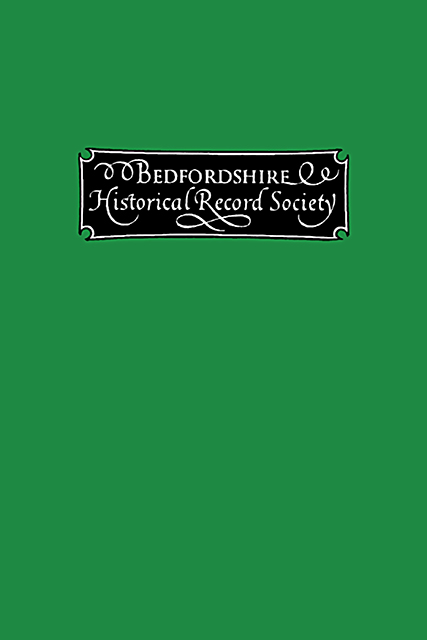Book contents
- Frontmatter
- Symbols and Abbreviations
- Contents
- General Note
- John Harvey of Ickwell, 1688-9
- Edmond and Christian Williamson of Husborne Crawley, 1709-20
- Henry Taylor of Pulloxhill, 1750-72
- John Salusbury of Leighton Buzzard, 1757-9
- John Pedley of Great Barford, 1773-95
- Elizabeth Brown of Ampthill, 1778-91
- Edward Arpin of Felmersham, 1763-1831
- Catherine Young (later, Maclear) of Bedford, 1832-5 and 1846
- Sir John Burgoyne of Sutton, 1854
- Major J. H. Brooks and the Indian Mutiny, 1857
- The Rev. G. D. Newbolt of Souldrop, 1856-95
- Some Letters from Bedfordshire Pioneers in Australia, 1842-86
- Index Nominorum et Locorum
- Index Rerum
- Miscellaneous Endmatter
The Rev. G. D. Newbolt of Souldrop, 1856-95
Published online by Cambridge University Press: 14 July 2023
- Frontmatter
- Symbols and Abbreviations
- Contents
- General Note
- John Harvey of Ickwell, 1688-9
- Edmond and Christian Williamson of Husborne Crawley, 1709-20
- Henry Taylor of Pulloxhill, 1750-72
- John Salusbury of Leighton Buzzard, 1757-9
- John Pedley of Great Barford, 1773-95
- Elizabeth Brown of Ampthill, 1778-91
- Edward Arpin of Felmersham, 1763-1831
- Catherine Young (later, Maclear) of Bedford, 1832-5 and 1846
- Sir John Burgoyne of Sutton, 1854
- Major J. H. Brooks and the Indian Mutiny, 1857
- The Rev. G. D. Newbolt of Souldrop, 1856-95
- Some Letters from Bedfordshire Pioneers in Australia, 1842-86
- Index Nominorum et Locorum
- Index Rerum
- Miscellaneous Endmatter
Summary
Introduction
Souldrop and Knotting, two small villages on either side of the Bedford to Rushden road, lie in the pleasant, hilly country to the north of Sharnbrook. The livings were consolidated in 1735, and in 1856, when the diary begins, the greater part of the land belonged to the Duke of Bedford, though by the end of the century it had passed through the hands of the Magniac family of Colworth House to be split up between several owners. Most of the villagers worked on the farms, though some at Souldrop were employed on the railway which ran through the parish. The population of the two parishes has never been large. From 293 in 1801 it rose to 461 in 1861, and then declined steadily to under 280 by the end of the century.
The two books in which this diary is written are kept with the parish records of Souldrop, according to the directions of the Rev. George Digby Newbolt, who began the first volume when he was presented to the combined living of Knotting-cum- Souldrop in 1856. It is by the kind permission of the present incumbent, the Rev. H. L. Clothier, that part is published here. The first volume runs from 1856 to 1885 ; the second from 1886 to 1930, for after Newbolt’s resignation in 1895 it was continued by his successor, but the extracts which follow cover Newbolt’s incumbency only.
The Rev. George Digby Newbolt came from a well-known clerical family. His father had been Vicar of Somerton, and his youngest brother, the Rev. W. C. E. Newbolt, became Canon and Chancellor of St. Paul’s Cathedral, and was a leader of the High Church movement. Among his many relations who were benefactors of the two churches was Mary Ann Dyson, an author and friend of the novelist, Charlotte M. Yonge of Hursley. The Rev. John Keble himself subscribed £3 towards the rebuilding of Souldrop chancel. The whole diary could be read as a commentary on Miss Yonge’s novels : the building and furnishing of new churches in a suitable Gothic style; the floral decorations at the greater festivals; the revival of the Harvest Festival as a religious feast and the reform of the old Harvest Home; the strict observance of the seasons of the Church’s year; regular daily services; and above all the new emphasis on the sacraments.
- Type
- Chapter
- Information
- Some Bedfordshire Diaries , pp. 200 - 225Publisher: Boydell & BrewerFirst published in: 2023



